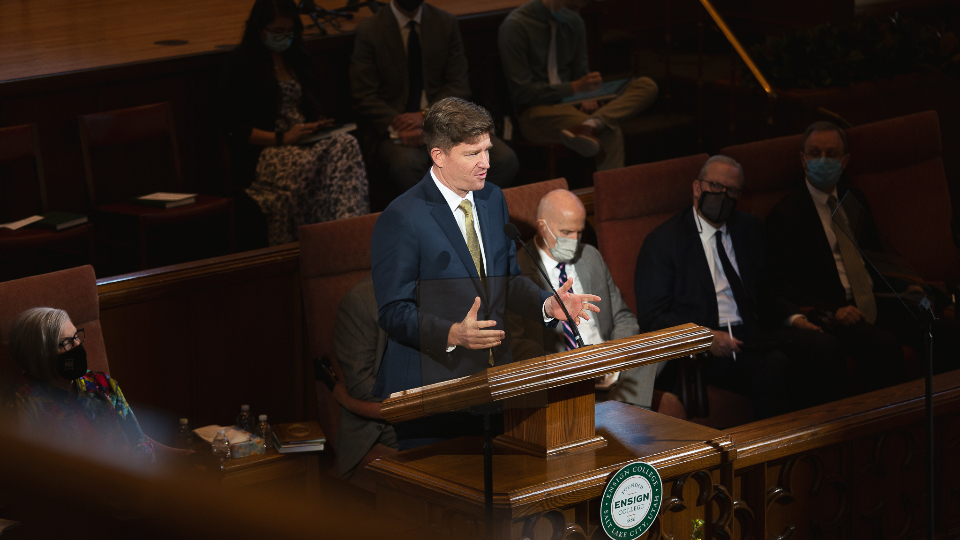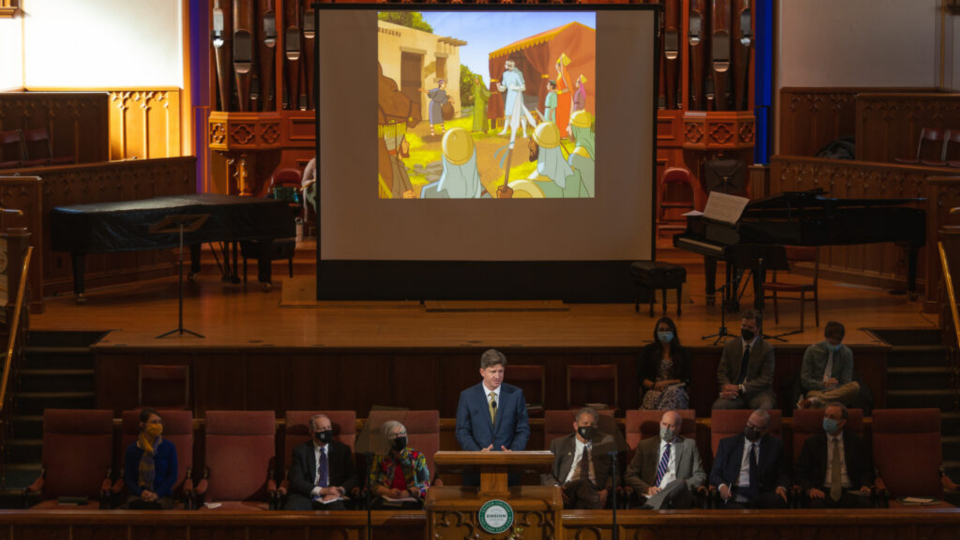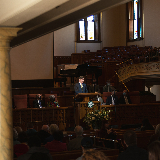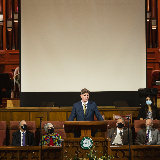| Keith A. Erekson, director of historical outreach and partnerships for The Church of Jesus Christ of Latter-day Saints, speaks to Ensign College students during a devotional at Assembly Hall on Temple Square in Salt Lake City on Tuesday, February 1, 2022. Photo courtesy of Ensign College, courtesy of Church News. All rights reserved. | 1 / 6 |
This story appears here courtesy of TheChurchNews.com. It is not for use by other media.
By Valerie Walton, Church News
During his time working with Church history, Keith A. Erekson, the director of historical outreach and partnerships for The Church of Jesus Christ of Latter-day Saints, has listened to thousands of questions from people who struggle with concerns and doubts about the Church. They range from the multiple accounts of the First Vision, to polygamy, to the prohibition on the participation of Black Latter-day Saints in priesthood and temple ordinances, to witnessing friends being excluded or insulted for identifying as LGBT.
“Maybe it’s a little of all of these and then some,” he said.
Many of these questions “invoke the existence and role of living prophets,” Erekson said in an Ensign College devotional held in the Assembly Hall on Tuesday, February 1.
Erekson cited the Old Testament story about Naaman in 2 Kings 5 seeking healing from the prophet Elisha as an example of a relationship Latter-day Saints might have today with living prophets.
Watch the full Ensign College devotional here.
Naaman, a successful military commander and warrior, was suffering from a skin disease. He approached Elisha, who had a reputation as a healer, according to the customs of his time: with a letter of recommendation from his king, a flourish of horses and chariots, and gifts of gold, silver and clothing.
“He also expected Elisha to behave the same way as other healers in their culture,” Erekson explained, “by calling aloud, waving his hand, or enacting some other ritual performance. But Elisha defied Naaman’s expectations by refusing the gifts and sending a simple message to wash seven times in a nearby river.”
Naaman instantly became angry and went away in a rage. Later, his servants talked him into trying the treatment, which worked.
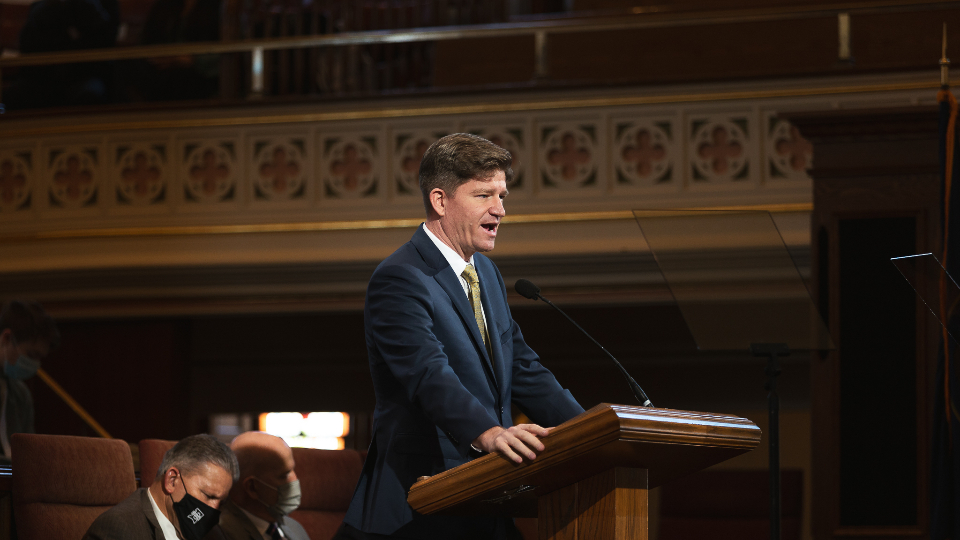
Erekson-Ensign-College
Keith A. Erekson, director of historical outreach and partnerships for The Church of Jesus Christ of Latter-day Saints, speaks to Ensign College students during a devotional at Assembly Hall on Temple Square in Salt Lake City on Tuesday, February 1, 2022. Photo courtesy of Ensign College, courtesy of Church News.All rights reserved.
“So here is the insight: Naaman’s instant rage surfaced when his expectations were challenged,” Erekson said. “He protested by saying, ‘I thought that for me he would surely come out.’ Yes, Naaman needed to humble himself, but the root problem was neither the prophet nor his prescription; it was the expectations Naaman brought to the encounter.”
Erekson asked his listeners what expectations they might have about prophets, how those expectations might be influenced by their upbringing and culture, and if they are assuming things that are incorrect.
“Admitting the errors in our own thinking is sometimes the most difficult part of understanding Church history because it takes humility to change our expectations and assumptions after we learn they are incorrect.”
‘Through the Will of God the Father’
Many oversimplify living prophets to a simple binary of being inspired or uninspired. However, instruction given by the Lord on the day the Church was organized, which is found in Doctrine and Covenants 21:1-2, gives three things that should be expected of prophets: “Behold, there shall be a record kept among you; and in it thou shalt be called a seer, a translator, a prophet, an apostle of Jesus Christ, an elder of the church through the will of God the Father, and the grace of your Lord Jesus Christ, Being inspired of the Holy Ghost … .”
“Prophets cultivate relationships with each of the three members of the Godhead and understanding these relationships helps dispel common misunderstandings of their work,” Erekson said.
Many cultures have models of prophets. For some, a prophet is a sphinx, riddler or soothsayer who speaks in anonymous riddles. For others, a prophet is a “lone voice who speaks out against all evil and oppression” and denounces every wrong. Another model is that of a cable news pundit who pins the blame for tragedies on the sins of an enemy group, offering harsh condemnations.
Some Latter-day Saints come to expect prophets to act like these models. “Then, if prophets speak too clearly in favor of vaccination, or if they fail to stand with or against the internet’s outrage of the day, or if they offer kindness instead of criticism of refugees, some turn away in rage like Naaman,” Erekson said.
Another unhelpful expectation is a distrust in a person who is influenced by culture. Every human is shaped by the language, customs, knowledge and experiences of individuals, families and societies, making it impossible for anyone — including prophets — to not be influenced by culture.
“In fact, Nephi explained that God speaks to prophets — and all of us — ‘according to their language, unto their understanding’ — in other words, our cultures” (2 Nephi 31:3).
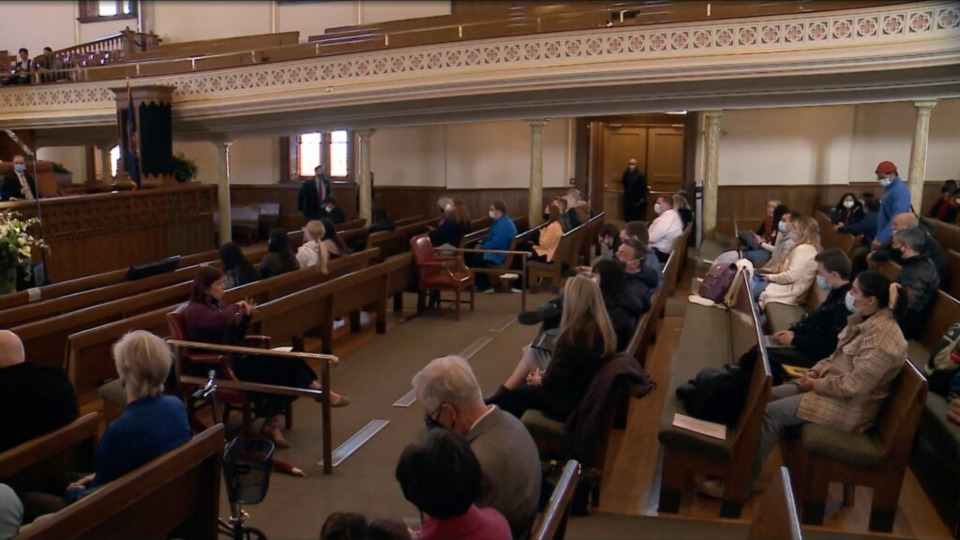
Ensign College
Ensign College students attend a devotional at Assembly Hall on Temple Square in Salt Lake City on Tuesday, February 1, 2022. Photo is a screenshot of the broadcast, courtesy of Church News. 2022 by Intellectual Reserve, Inc.
Erekson said that prophets interact with their cultures, such as Joseph Smith using seer stones, Joseph F. Smith pondering the afterlife during the ravages of World War I, or President Russell M. Nelson counseling Latter-day Saints to abandon attitudes and actions of prejudice in a society built on discrimination.
“Prophets participate in their cultures as do you and I, and the way we all progress is by following God in our cultures.”
Another expectation is that to follow the prophet, one must imitate their every deed, such as raising pigeons because President Thomas S. Monson did. “Prophets do not urge us to follow or imitate them, but to follow and imitate the Savior,” Erekson said.
“Stated another way, the prophets do not teach us to follow them, but to ‘hear Him’!”
Some expect prophets to receive revelation “only by kneeling alone and asking for it,” Erekson said. While many revelatory experiences happen that way, prophets also receive revelation with other people through councils. Today, the Church is administered through councils comprised of members of the First Presidency, Quorum of the Twelve Apostles, Seventy, Presiding Bishopric and general organizations.
“If we expect revelation to come only to individuals, then we will miss many of God’s modern dealings with living prophets.”
‘The Grace of Your Lord Jesus Christ’
Why do prophets need the grace of Christ? “For the same reasons that you and I depend on His grace — to forgive our sins, succor our infirmities, mitigate our shortcomings, expand our capabilities, turn weaknesses into strengths,” Erekson said.
“Most of the time,” Erekson said, “the differences of opinion serve to bring all perspectives on issues into the discussion.”
The only person to ever live a mistake-free life was Jesus Christ. Prophets are aware of their own shortcomings, Erekson said, citing Moses who worried over his speaking inadequacies, Moroni who felt the same about his writing, and Joseph Smith who published his errors and divine rebukes.
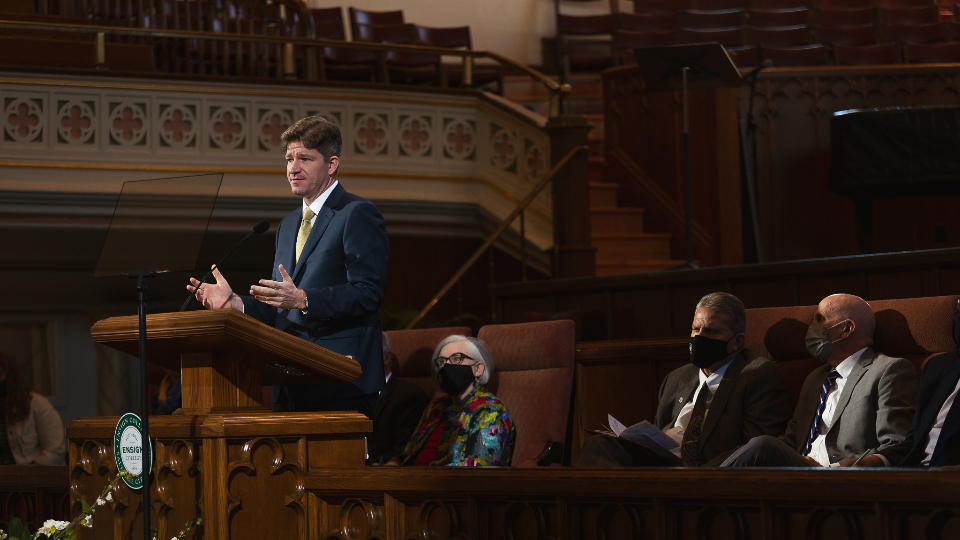
Erekson-Ensign-College
Keith A. Erekson, director of historical outreach and partnerships for The Church of Jesus Christ of Latter-day Saints, speaks to Ensign College students during a devotional at Assembly Hall on Temple Square in Salt Lake City on Tuesday, February 1, 2022. Photo courtesy of Ensign College, courtesy of Church News.All rights reserved.
“We should also not expect that prophets do not get tricked,” Erekson said. He gave a few scriptural and modern examples of prophets being fooled. For instance, when Joseph Smith lost the 116 pages of the Book of Mormon manuscript, he “was told simply, ‘You cannot always tell the wicked from the righteous’ (Doctrine and Covenants 10:37). The message was not ‘One day you will learn how to identify the wicked.’ Just, ‘you cannot.’”
Simply citing the many instances of when prophets disagreed, made mistakes or were tricked is incomplete, Erekson said, “without understanding that prophets serve ‘through the … grace of [our] Lord Jesus Christ.’ His grace is sufficient to bring them to unanimity, refine their souls and succor them.”
‘Being inspired of the Holy Ghost’
Prophets don’t know everything about the future. “While it is true that God reveals some of His secrets to prophets, and that some prophets including Moses, Enoch and Nephi received sweeping visions, that does not mean that every prophet knows everything about everything,” Erekson said. The things they do know are not always spelled out for them.
“As the ‘mouthpiece’ of the Lord, they do not simply open their mouths and the word of God flows out,” he said. “Sometimes revelation has come as dictated wording, but prophets also receive inspiration, feelings and impressions that they must put into words and actions. Sometimes they explore paths that don’t work out.”
Erekson then addressed the idea that the prophet will never lead the Church astray — wording that comes from a statement made by Wilford Woodruff announcing the end of plural marriage. Over time, “additional assumptions have been attached — that the practices of the Church should never change, and that following prophetic counsel should cause no suffering,” he said.
“In its complete original context, Wilford Woodruff’s teaching emphasized that the prophet would not … lead people ‘astray from the oracles [or revelations] of God and from their duty.’ Prophets will not lead us away from their true witness of Jesus Christ, from His revelations or from the path, however hard it may be, to follow Him.
“Because prophets act and preach by the Spirit, we have a duty to seek the Spirit to understand and receive their message.”
Prophets work to be inspired of the Holy Ghost because they don’t know everything, and they gain light and truth from the Lord line upon line.
‘Upheld by … the Church’
Doctrine and Covenants 107:22 instructs that prophets are to be “upheld by the confidence, faith, and prayer of the church.”
Today, members of the Church uphold the prophets “with confidence gained through the companionship of the Holy Ghost, with faith in the Lord Jesus Christ, and through prayer to God our Father,” Erekson said.
“We should rightly expect prophets to be called through the will of God and the grace of Jesus Christ and receive ongoing guidance through the inspiration of the Holy Ghost,” Erekson said. “As we do so, we can, like Naaman, shed incorrect expectations and assumptions about prophets that both impede our ability to be blessed and prompt divisive anger.”
Copyright 2022 Deseret News Publishing Company.
